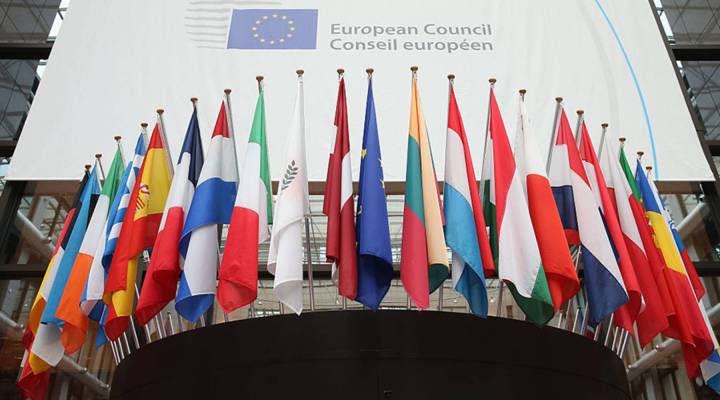
EU moves to shield companies that trade with Iran from U.S. sanctions
EU moves to shield companies that trade with Iran from U.S. sanctions

The United States has re-imposed sanctions on Iran after pulling out of a multilateral deal to curb the Islamic Republic’s nuclear activities. The White House says it wants a much tougher deal.
But the European Union, along with other signatories, supports the agreement Washington abandoned and is determined to uphold it.
The EU is pledging to protect any European corporation that wants to continue trading with Iran from U.S. sanctions. Those penalties include potential multibillion-dollar fines and exclusion from the U.S. market.
Brussels has two potential weapons at its disposal. First, there’s the so-called Blocking Regulation.
“The Blocking Regulation would make it illegal for European companies to comply with U.S. sanctions against Iran,” said Agathe Demarais of the Economist Intelligence Unit. “But it’s a rather blunt instrument. It has not been fully implemented by the member states, and it would be extremely surprising to tell European companies that if they comply with U.S. sanctions, they will be fined. That would be a surprising way of protecting companies.”
The second weapon is more subtle: Next month, the EU unveils a new electronic payment system designed to move money in and out of Iran without American scrutiny.
“The intention is to create some economic independence for European companies so that they’re not so vulnerable to American pressure,” said Sanam Vakil of the Chatham House think tank.
But the U.S. Treasury will be monitoring the system closely, making it difficult for European multinationals to use it without Washington noticing.
The commercial realities facing big European companies will likely trump the EU’s defiance.
“These companies are not going to risk losing their American business and engaging in a legal battle that could then affect their revenue and their bottom line” Vakil said.
That explains why most, if not all, European multinationals with business interests in Iran have pulled out of the Islamic Republic, including the French energy giant Total, German manufacturer Siemens and aircraft builder Airbus.
Not everyone sees this as a slam dunk for the United States, however. Hassan Hakimian, director of the London Middle East Institute at the University of London’s School of Oriental and African Studies, thinks the EU’s new payment system could represent a threat to the existing financial order. Hakimian said that the Society for Worldwide Interbank Financial Telecommunication, which oversees international transactions between banks, is already feeling the heat.
“A system like SWIFT is fearful that they would end up having rivals set up by the likes of China and Russia and others who are now demanding alternative systems for ensuring smooth and uninterrupted international financial transactions,” Hakimian told Marketplace. The emergence of a new European system is a small but clear sign of America’s waning hegemony.
“I think it’s a reminder that, as some European leaders have said, they need to ensure they do not continue to rely on the U.S. in the years to come,” he said.
Hakimian believes that the EU’s sanctions-busting payment scheme could eventually help undermine U.S. domination of the world’s financial system.
There’s a lot happening in the world. Through it all, Marketplace is here for you.
You rely on Marketplace to break down the world’s events and tell you how it affects you in a fact-based, approachable way. We rely on your financial support to keep making that possible.
Your donation today powers the independent journalism that you rely on. For just $5/month, you can help sustain Marketplace so we can keep reporting on the things that matter to you.


















